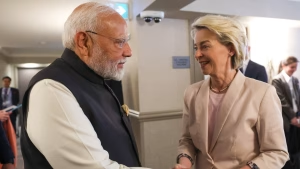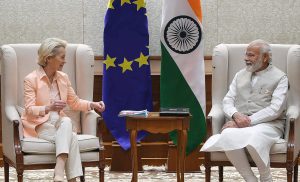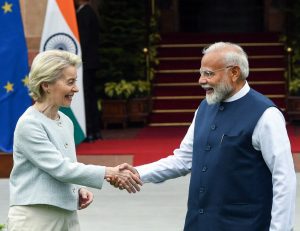New Delhi – India and the European Union (EU) are set to make progress in negotiations on a free trade deal, with the 13th round of talks beginning today in New Delhi. The discussions will focus on crucial areas such as non-tariff barriers, market access, and public procurements. Both sides remain committed to concluding negotiations by the end of this year. The India EU free trade agreement forms the backbone of these high-level engagements.
Strategic Engagements Ahead of the Summit

The coming weeks will witness several high-level interactions in both New Delhi and Brussels to finalize the strategic agenda and deliverables for the India-EU Summit in early 2026. Leaders from both sides are working to ensure the India EU free trade agreement is ready for announcement by then. On September 4, Prime Minister Narendra Modi spoke with European Council President Antonio Costa and European Commission President Ursula von der Leyen, emphasizing the urgency of closing the negotiations.
Political Drive from Senior EU Leaders
To give momentum to the 13th round of talks, EU trade commissioner Maros Sefcovic and agriculture commissioner Christophe Hansen will visit New Delhi. Their presence is expected to provide political drive and prevent the India EU free trade agreement discussions from being delayed by technical issues. According to negotiators, the deal has gained significance as global markets face disruptions from US tariff policies. Both India and the EU are seeking to derisk their trade dependencies.
Progress Across Negotiation Chapters


Out of 23 chapters of the proposed India EU free trade agreement, 11 have already been concluded. These include intellectual property, customs and trade facilitation, transparency, regulatory practices, SMEs, sustainable food systems, dispute settlement, competition and subsidies, digital trade, and an anti-fraud clause. Negotiators are also close to finalizing capital movement. The next rounds will dive into technical barriers to trade, sanitary and phytosanitary standards, rules of origin, and public procurement—issues seen as more complex but essential for final consensus.
Balancing Market Demands
India has clearly defined its red lines by excluding sensitive items such as rice, sugar, and dairy products from the India EU free trade agreement package. Meanwhile, the EU is pushing for greater access to Indian markets for automobiles and spirits. At the same time, Europe is open to supporting exports of aquaculture goods, particularly shrimps, which have been affected by recent US tariff hikes. India exported shrimps worth about $2.8 billion to the US last year, making EU support crucial in offsetting these trade impacts.
Also Read: Russian Economy Collapse: Shocking US Treasury Tariff Strategy
Services and Investments at the Core
Both sides exchanged offers on services and investments in July, marking an important step in the India EU free trade agreement process. Evaluating these offers to strike a balanced equilibrium remains a key priority. Technical issues linked to the digital trade chapter are also being addressed, with an in-principle agreement already achieved. Negotiators believe resolving these remaining details could pave the way for concluding the deal within the targeted timeline.
Broader Strategic Cooperation


Beyond trade, the negotiations are closely tied to broader India-EU cooperation. On September 17, EU foreign and security policy chief Kaja Kallas will present a vision for a new strategic agenda, expected to be endorsed by the European Council before year-end. This agenda will provide the framework for the 2026 summit, complementing the progress of the India EU free trade agreement.
Security and Technology Partnerships
The partnership also extends to security and technology. This week, the EU’s Political and Security Committee will engage with Indian counterparts to reinforce counterterrorism cooperation. In November, external affairs minister S Jaishankar will join the Indo-Pacific Forum in Brussels. Later, the India-EU Trade and Technology Council will convene to shape cooperation in areas such as AI, quantum computing, biotech, and defence—strategic pillars that support the India EU free trade agreement negotiations.
Race Toward Year-End Conclusion


With two crucial rounds of talks scheduled—today in New Delhi and October 8 in Brussels—the urgency to conclude the India EU free trade agreement by December is clear. Both sides have already closed significant chapters and are aligning on services, investments, and digital trade. The political push from senior EU officials and India’s proactive approach underline the shared determination to deliver results.
If successful, the India EU free trade agreement will not only boost trade flows but also shape a stronger strategic partnership, reinforcing cooperation across economic, technological, and security domains.

